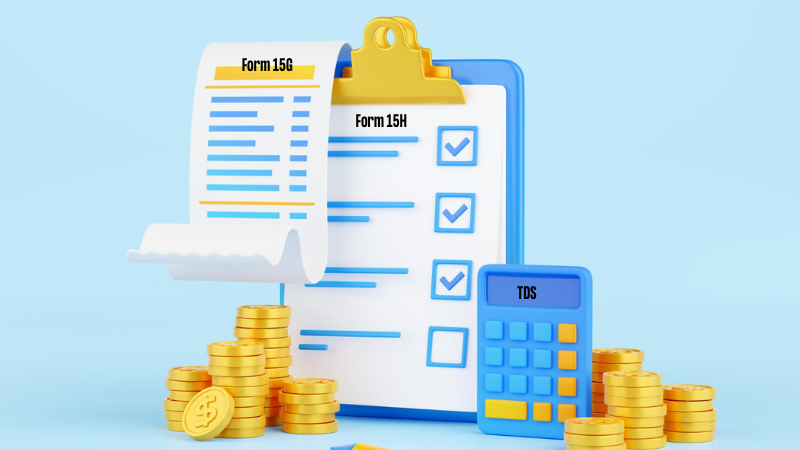
The Income Tax Act requires the assessees to pay tax on all the income that they have earned during the financial year. Taxpayers usually account for their primary source of income while filing the returns but the income from other sources is usually missed. These incomes usually include passive income sources like interest income or dividend or rent income, especially in the case of senior citizens. The government in a bid to reduce the cases of tax evasion has levied TDS provisions on such income. However, in the majority of cases, these incomes form a very minute part of their total income and taxpayers have the unnecessary burden of waiting for a refund of the same.
Read More : Claiming tax deduction on interest from savings account
Form 15G and Form 15H are solutions to these issues where taxpayers can avoid the deduction of TDS on such income. Given below are the meaning of these forms and related details of the same.
What are Forms 15G and15H?
Form 15G is a self-declaration form that is to be submitted by taxpayers (individuals, HUFs, and trusts) that allows them to claim TDS exemption on the interest income received from banks or other financial institutions. This form can be submitted by taxpayers who are below the age of 60 years.
Form 15H, on the other hand, can be filed by taxpayers who are above the age of 60 years (senior citizens). By submitting these forms, the banks and other financial institutions understand that they are not mandated to deduct TDS under the Income Tax Act and its provisions relating to TDS. This form is to be provided at the beginning of the year so as to provide the banks with timely information about the TDS applicability on the taxpayers’ accounts.
Who can use Forms 15G and 15H?
The Income Tax Act has laid down specific eligibility criteria for taxpayers who can submit Form 15G and Form 15H. These criteria are detailed below.
- Form 15G
The following persons can submit Form 15G,
- Any resident citizen who is below the age of 60 years
- The interest income from their savings account is below the basic exemption limit of Rs. 2,50,000
- The taxpayer has no final tax liability
- The taxpayer has a valid PAN number.
- Form 15H
The following persons can submit Form 15H,
- Any resident citizen who is above the age of 60 years
- The interest income from their savings account is below the basic exemption limit of Rs. 3,00,000
- The taxpayer has no final tax liability
- The taxpayer has a valid PAN number.
By providing Form 15G and Form 15H, eligible taxpayers who have a maximum interest income of Rs. 10,000 or Rs. 50,000 respectively will not be liable for TDS on such income. However, in case the taxpayers do not provide a valid PAN card, TDS will be deducted at a rate of 20%v instead of 10% as applicable on the interest income from savings accounts.
Cases for which Form 15G and Form 15H can be submitted?
Form 15G and Form 15H can be submitted to avoid TDS deductions on multiple incomes along with interest income from savings accounts. The other instances where Form 15G and Form 15H can be submitted to avoid TDS are mentioned below.
Income from corporate bonds
Investment in corporate bonds is one of the many debt investment options available to investors. The interest income received by the investors is taxable in their hands as per the applicable slab rates and is subject to TDS provisions. TDS is to be deducted from the interest income from corporate bonds if such income exceeds Rs. 5,000 in a year. However, by submitting Form 15G or Form 15H as applicable, such TDS can be avoided.
Receipts from LIC
Section 10(10D) provides exemptions for the proceeds received from an insurance policy. In any other case, insurance proceeds over Rs. 1,00,000 are subject to TDS at the rate of 5%. However, if the total table income is below the basic exemption limit, i.e., if the assessee has a nil tax liability, they can submit Form 15G and Form 15H, as the case may be, to avoid tax being deducted on such income.
Dividend income
Dividend income is also taxable in the hands of taxpayers and companies are liable to deduct TDS if such income is above Rs. 5,000. Taxpayers, however, can submit Form 15G/ 15H to avoid TDS on the dividend income.
Rental income
As per the provisions of the Income Tax Act 1961, rental income of Rs. 2,40,000 or more is subject to provisions of TDS. Therefore, if a person has rental income but a gross total income below the basic exemption limit, they can submit Form 15G/15H. Upon submitting the relevant forms, the tenant will not be obligated to deduct TDS on the rental income before paying the same to the owner of the property.
Withdrawal from EPF
If an employee withdraws from their EPF account before a period of 5 years of continuous service, such withdrawal is liable for a TDS deduction. However, if the employees are eligible for providing Form 15G/15H, they can submit the same to avoid TDS on their premature EPF withdrawal of more than Rs. 50,000.
Insurance commission
Insurance commission of more than Rs. 15,000 is liable for TDS deduction. Insurance agents can submit Form 15G/15H as applicable if their final tax liability is nil.
Post Office Deposits
Income from Post Office Deposits in digitized post offices is another income that is liable for TDS. However, if the taxpayer is eligible for submitting Form 15G or 15H as the case may be, they can escape the levy of TDS on income from post office deposits.
How to fill out Forms 15G and 15H
Here are the steps on how to fill out Forms 15G and 15H:
- Download the form from the Income Tax Department website.
- Enter your name, PAN, and residential status.
- If you are filling out Form 15G, enter your total income for the previous financial year.
- If you are filling out Form 15H, enter your total income for the previous financial year and the amount of your investments.
- Sign and date the form.
- Submit the form to the bank or financial institution where you have your savings account or fixed deposit.
Where to submit Forms 15G and 15H
Here are some of the places where you can submit Forms 15G and 15H:
- Banks: You can submit the forms to any bank branch where you have a savings account or fixed deposit.
- Financial institutions: You can submit the forms to any financial institution where you have a savings account or fixed deposit.
- Post office: You can submit the forms to the post office if you have a savings account with the post office.
You can also submit the forms online through the Income Tax Department website.
Here are the steps on how to submit Forms 15G and 15H online:
- Go to the Income Tax Department website.
- Click on the “Forms” tab.
- Select the “15G/15H” form.
- Fill out the form and upload it.
- Pay the requisite fees.
- Submit the form.
Conclusion
Form 15G and Form 15H are used to avoid the unnecessary deduction of tax for taxpayers who do not have an income above the gross taxable income. The primary condition for these forms is that the final tax liability of the taxpayers should be nil. Therefore, there is no question of tax evasion which is also the premise of levying TDS provisions.
FAQs
No, Form 15G or 15H is not applicable for NRI.
yes, if a person has wrongly submitted Form 15g/15H without being eligible for the same, they are liable for a penalty under the provisions of the Income Tax Act. These penalties include,
-If the amount of tax evasion exceeded Rs. 25,00,000, the penalty for such an offense is a fine and jail term of a minimum of 6 months and a maximum of 7 years.
-If the amount of tax evasion is less than Rs. 25,00,000, the penalty is a fine and a jail term of a minimum of 3 months and a maximum of up to 2 years.
Yes. Form 15g/15H has to be submitted every year to declare that the taxable income is below the basic exemption limit and the tax liability is nil.
Yes. Most banks provide the facility of online submission of Form 15G/15H as well as offline. Accountholders eligible for Form 15G/15H can download the same after logging into the net banking account and submit it after duly filling and signing the same
No. Form 15G/15H is a self-declaration form that has to be submitted by eligible taxpayers at the beginning of the financial year to avoid TDS on their interest income.


























